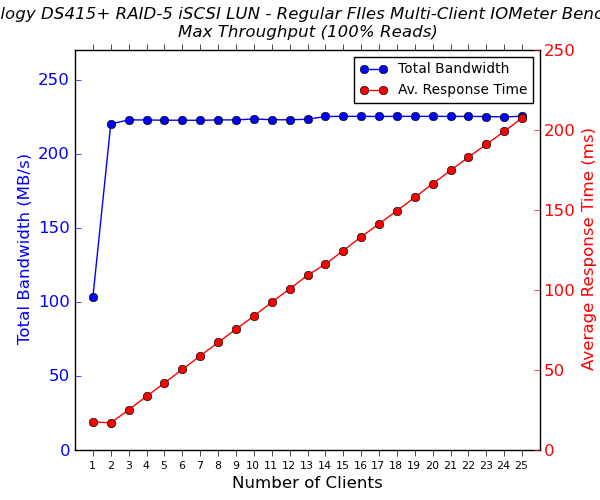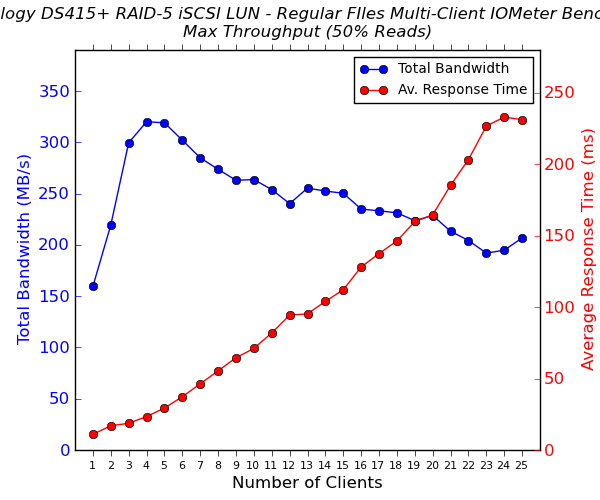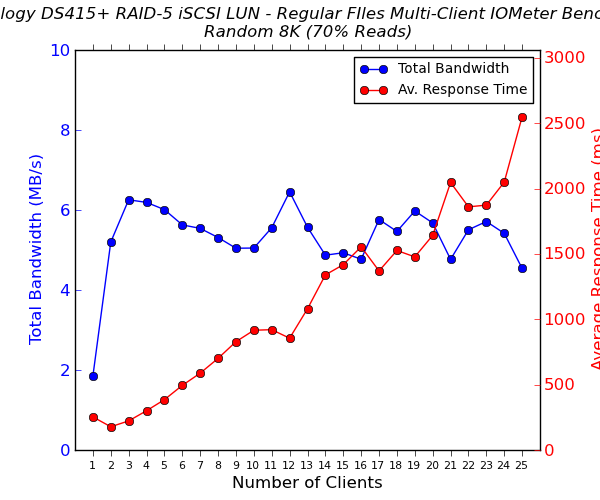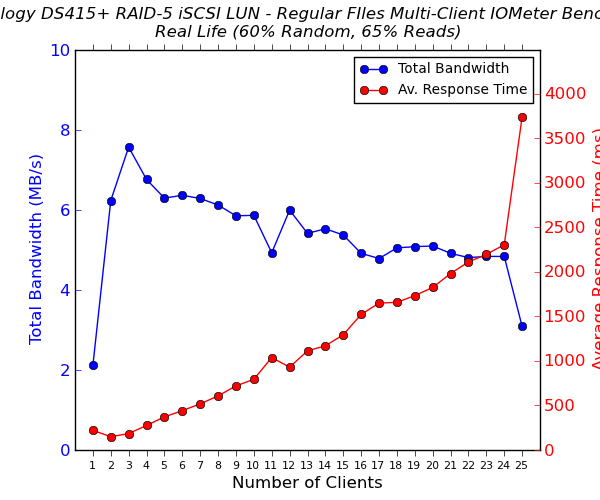Synology DS415+ Review: DSM on Intel Rangeley
by Ganesh T S on October 30, 2014 7:30 AM EST- Posted in
- NAS
- Storage
- Intel
- Synology
- Silvermont
- Enterprise
- Rangeley
Multi-Client iSCSI Evaluation
As virtualization becomes more and more popular even in home / power user settings, the importance of the iSCSI feature set of any COTS NAS can't be overstated. Starting with our ioSafe 1513+ review, we have started devoting a separate section (in the reviews of NAS units targeting SMBs and SMEs) to the evaluation of iSCSI performance. Since we have already looked at the way iSCSI LUNs are implemented in DSM in the ioSafe 1513+ review, it won't be discussed in detail.
We evaluated the performance of the DS415+ with file-based LUNs as well as configuring a RAID-5 disk group with a single LUN. The standard IOMeter benchmarks that we used for multi-client CIFS evaluation were utilized for iSCSI evaluation also. The main difference to note is that the CIFS evaluation was performed on a mounted network share, while the iSCSI evaluation was done on a 'clean physical disk' (from the viewpoint of the virtual machine).
Performance Numbers
The four IOMeter traces were run on the physical disk manifested by mapping the iSCSI target on each VM. The benchmarking started with one VM accessing the NAS. The number of VMs simultaneously playing out the trace was incremented one by one till we had all 25 VMs in the fray. Detailed listings of the IOMeter benchmark numbers (including IOPS and maximum response times) for each configuration are linked below:
- Synology DS415+ - iSCSI LUN (Regular Files) - 4x 4 TB / RAID-5 / 2x 1G
- Synology DS415+ - Single LUN on RAID - 4x 4 TB / RAID-5 / 2x 1G




Since the number of NAS units that we have put through this evaluation is limited, the only real point of comparison is the Seagate NAS Pro 4-bay. The ioSafe 1513+ graphs are also linked above, but it has five drives instead of the four in the DS415+. The only graphs for apples-to-apples comparison are those of the Seagate NAS Pro 4-bay units. We see advantages in terms of average access times for the Synology DS415+. This is only to be expected, given the faster clock for the Rangeley SoC in the DS415+.
As more NAS units are processed, we hope this section will provide readers with a way to quickly get an idea of the competitive performance of a particular NAS unit when it comes to iSCSI support.










41 Comments
View All Comments
ganeshts - Thursday, October 30, 2014 - link
Encryption testing is with a single client. The limitation is on the client side which has only a single GbE link.Reason it is done this way is to make sure we have data that can be compared against other units that have been evaluated before.
thewishy - Friday, October 31, 2014 - link
Well, the client side isn't entirely the problem here. You could do LACP on the client side too, and still only see gigabit. Ethernet was never designed to receive frames out of order, and the two interfaces aren't easily syncronised - so traffic between a pair of endpoints is sent over only one link. Fine and dandy for busy networks, poor in this scenarioSonic01 - Tuesday, November 4, 2014 - link
Makes sense, it's a shame you guys don't test this as some of us might be using a client or server configured with link aggregation.I've purchased this NAS, a LAG capable switch and network card for my desktop and server, will see what kind of performance I get...
xenol - Thursday, October 30, 2014 - link
Gallery: Gallery Title!I laughed harder than I should at that.
shelbystripes - Thursday, October 30, 2014 - link
Two questions I can't find the answers for anywhere:1) Does the 415+ come with ECC RAM?
2) If not, does it work if you put ECC RAM in it?
One of the key potential benefits of Avoton/Rangeley is support for ECC RAM, but Synology doesn't mention it, and it seems like the kind of thing you'd advertise (or at least list in the specifications) if you used it.
ganeshts - Thursday, October 30, 2014 - link
Nope, no ECC RAM. The platform may support it, but Synology's board doesn't. At this price point, ECC support is difficult to get.shelbystripes - Thursday, October 30, 2014 - link
ganeshts: I don't understand this. I'm not saying I don't understand you, or don't believe you. (If I didn't think your answer was possible, I wouldn't have asked the question.) What I am saying is, I don't understand why ECC RAM isn't supported in this model.From the block diagram under "Platform Analysis", it appears that the memory controller is built into the CPU/SoC, and the C2538 they're using does support ECC RAM. DDR3 SODIMMs are 204-pin whether they're ECC or not, and while it's not really discussed in this review, a teardown on legionhardware.com shows the memory as a single SODIMM module. Since Synology is using an SoC with an integrated ECC-capable memory controller, I can't understand why they would leave out ECC memory support. It seems like it would have to be an active choice on their part not to, in order to discourage people from sticking in ECC RAM on their own. (Synology doesn't like its users upgrading RAM and claims that doing so will void the warranty, which is something the PC industry stopped pulling a decade ago.) All the necessary hardware should be there, right? So why doesn't it work if you just stuck an ECC UDIMM in there? Did Synology actively disable this feature of the SoC?
chubbypanda - Thursday, October 30, 2014 - link
While dimensions and sockets for DDR3 and ECC DDR3 modules are physically the same, they've got different electrical layouts! Inserting regular memory module into ECC DDR3 equipped board would result in damaged memory module and possibly the board.As why Synology chose not to use ECC memory (despite they could have), Ganesh already answered that.
jabber - Friday, October 31, 2014 - link
Plus it leaves them open to sell a version in the future that does support ECC and charge you an extra $400 for the benefit.shelbystripes - Friday, October 31, 2014 - link
Chubbypanda: Thanks for your reaponse, it put me on the right track.I was about to say that I don't buy this, since both ASUS and SuperMicro make Avoton boards that are listed as taking both ECC and non-ECC RAM. But on a closer look, only the SuperMicro mATX boards (which have full-size 240-pin DIMM sockets) claim to support both ECC and non-ECC RAM. Their mini-ITX boards (which have 204-pin SODIMM sockets) support ECC RAM only. The missing pins in SODIMMs must be ones that would allow cross-compatibility (probably by providing separate electrical signals for ECC and non-ECC RAM, at least for detection at startup).
I think that's it. Since the Synology unit uses SODIMMs, it can only support one or the other, and they chose non-ECC. Boo. If (as jabber mentioned) they release a higher-end version with ECC RAM, I'll buy it... If I haven't given up waiting for it and built myself a FreeNAS box. I had been waiting and hoping for the inevitable Avoton Synology box, but I hadn't anticipated this.